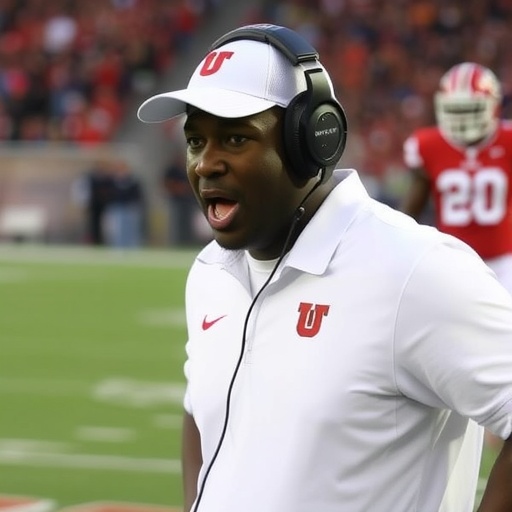Utah Crushes Colorado 53-7: Deion Sanders Calls It Worst Defeat of Coaching Career as Byrd Ficklin Shines
In a stunning display of dominance that left the college football world buzzing, the Utah Utes obliterated the Colorado Buffaloes 53-7 on Saturday night, marking what head coach Deion Sanders described as the most humiliating loss of his coaching tenure. Freshman quarterback Byrd Ficklin emerged as the unlikely hero, throwing for 320 yards and four touchdowns in his first major start, propelling Utah to a historic rout in Boulder.
- Byrd Ficklin’s Breakout Performance Ignites Utah’s Aerial Attack
- Utah Defense Delivers Turnovers and Shutdown in Boulder Blowout
- Deion Sanders’ Raw Emotion: ‘This Is the Lowest Point of My Career’
- Historic Implications: Utah’s Mastery Over Rival Colorado Reshapes Big 12 Race
- Looking Ahead: Playoff Paths and Rebuild Challenges for Utah and Colorado
The game, played under the lights at Folsom Field, showcased Utah’s superior preparation and execution against a Colorado team that entered with high expectations under Sanders’ flashy leadership. What began as a competitive matchup quickly devolved into a one-sided affair, with the Utes’ defense forcing five turnovers and their offense piling on points relentlessly. This victory not only solidifies Utah’s position in the Big 12 but also raises questions about the trajectory of Deion Sanders’ program at Colorado.
Byrd Ficklin’s Breakout Performance Ignites Utah’s Aerial Attack
At the center of Utah’s offensive fireworks was 19-year-old freshman Byrd Ficklin, whose poise and precision dismantled Colorado’s secondary from the opening drive. Stepping in for an injured starter, Ficklin completed 22 of 28 passes for 320 yards, including touchdown strikes of 45, 32, 18, and 12 yards to a variety of receivers. His performance was a revelation in college football, where true freshmen rarely shoulder such a load, let alone excel.
“Byrd was locked in from the jump,” said Utah head coach Kyle Whittingham post-game. “He’s got that it-factor – quick release, smart decisions, and zero fear. Tonight, he showed why we recruited him so hard.” Ficklin’s efficiency rating soared to 185.7, and he added a rushing touchdown on a 22-yard scramble in the third quarter, further embarrassing a Colorado defense that had struggled with mobility all season.
The Utes’ ground game complemented Ficklin’s passing clinic perfectly. Running back Micah Bernard rushed for 142 yards and two scores on 18 carries, while the offensive line, anchored by All-Big 12 center Jordan Agasiva, provided ample protection and holes. Utah amassed 512 total yards, with 320 through the air – a season-high that highlighted their balanced attack. This offensive outburst was no fluke; it built on Utah’s reputation for physical, disciplined play, now enhanced by Ficklin’s emerging star power.
Statistically, Ficklin’s night drew comparisons to past Utah greats like Tyler Huntley, who led the Utes to a Rose Bowl victory. But for a freshman facing a hyped-up Colorado squad coached by Deion Sanders, the achievement carried extra weight. Fans on social media erupted with memes and highlights, dubbing Ficklin “The Byrd Storm” and predicting Heisman whispers by season’s end.
Utah Defense Delivers Turnovers and Shutdown in Boulder Blowout
While Ficklin stole the headlines on offense, Utah’s defense was the unsung hero in this 53-7 thrashing of Colorado. The Utes forced five turnovers – three interceptions and two fumbles – and limited the Buffaloes to just 187 total yards, their lowest output since Sanders took over. Linebacker Karene Reid led the charge with 12 tackles, a sack, and an interception returned 35 yards for a touchdown, setting the tone early.
Colorado’s offense, which had shown flashes of brilliance earlier in the season under quarterback Shedeur Sanders, was stifled from the outset. Shedeur completed only 14 of 25 passes for 112 yards and two picks, sacked four times by Utah’s relentless front seven. The Buffaloes managed just 7 points on a late field goal and a garbage-time touchdown, underscoring their inability to protect the pocket or sustain drives against Utah’s aggressive scheme.
“Our defense played with heart and hunger,” Whittingham noted. “We knew Colorado had talent, but we prepared to swarm them. The turnovers were huge – they flipped the momentum and broke their spirit.” Indeed, Utah’s special teams contributed too, with a blocked punt leading to a short-field touchdown in the second quarter. The Utes held Colorado to 2-of-12 on third downs and 0-for-4 in the red zone, a defensive masterclass that echoed their national championship-caliber units from years past.
This performance places Utah among the top defenses in college football, allowing just 12.3 points per game entering the matchup. Players like safety Tao Taavao and defensive end Gabe Sloan were pivotal, with Taavao notching two pass breakups and Sloan adding 1.5 sacks. For Colorado, the defensive lapses exposed deeper issues, as their unit has now surrendered 35+ points in three of five games this season.
Deion Sanders’ Raw Emotion: ‘This Is the Lowest Point of My Career’
Post-game, Deion Sanders, the charismatic Hall of Famer turned coach, didn’t mince words about the 53-7 debacle. Visibly shaken in his press conference, Sanders called it “the worst defeat of my coaching career,” a stark admission from a man known for his unshakeable confidence and Prime Time flair.
“Man, we got whooped. Plain and simple,” Sanders said, his voice cracking slightly. “Utah came out and punched us in the mouth, and we never recovered. This hurts deep – for our players, our fans, everybody. I’ve been in big games, won Super Bowls, but this? This is rock bottom.” Sanders, in his second year at Colorado, has revitalized the program with high-profile recruits and national attention, but losses like this threaten to derail the momentum.
The coach pointed to execution errors and preparation lapses as culprits. “We talked all week about starting fast, but we came out flat. Penalties killed us – 11 for 95 yards. And our defense? They fought, but we couldn’t get off the field on offense.” Sanders praised his son Shedeur’s resilience but lamented the turnovers that gifted Utah short fields. Off the field, Sanders’ reaction resonated with Buffaloes faithful, who packed Folsom Field expecting a turnaround but witnessed a rout instead.
In the broader context of Deion Sanders’ coaching journey, this loss stands out. His debut season at Colorado ended 4-8, but with a bowl berth in 2023, hopes were high for 2024. Now, at 2-3 overall and 0-2 in Big 12 play, Sanders faces mounting pressure. Yet, true to form, he ended on a motivational note: “We’ll bounce back. Prime Time don’t quit.” His candor could rally the team, but it also fuels speculation about roster changes and strategic shifts.
Historic Implications: Utah’s Mastery Over Rival Colorado Reshapes Big 12 Race
This 53-7 victory marks Utah’s most lopsided win over Colorado since 2011 and completes a rare season sweep in the heated rivalry, which dates back to 1896. The Utes now lead the all-time series 33-31-3, and this blowout reinforces their dominance in recent years – winning four of the last five meetings. For college football purists, it evokes memories of Utah’s 2004 Fiesta Bowl upset and their 2008 BCS run, signaling a return to elite form.
In the Big 12 standings, Utah improves to 4-1 overall and 2-0 in conference, positioning them as frontrunners alongside Kansas State and Oklahoma State. The win boosts their resume for a potential College Football Playoff berth, especially with tough road games against USC and UCLA looming. Colorado, meanwhile, drops to 2-3 (0-2 Big 12), jeopardizing their bowl eligibility and intensifying scrutiny on Sanders’ rebuild.
Attendance at Folsom Field was a sellout of 50,183, but the electric atmosphere turned somber by halftime, with boos echoing after Utah’s third touchdown. Media coverage exploded post-game, with ESPN analysts praising Utah’s depth and questioning Colorado’s overhyped roster. Social media trends like #UtesCrushBuffs and #PrimeTimePain trended nationwide, amplifying the story’s viral reach.
Behind the scenes, Utah’s preparation was meticulous. Whittingham’s staff scouted Colorado’s tendencies extensively, exploiting weaknesses in pass protection and run defense. The Utes’ 7-0 halftime lead ballooned to 35-0 by the end of the third, with reserves playing the fourth quarter to preserve health. This strategic depth underscores why Utah remains a perennial contender in college football.
Looking Ahead: Playoff Paths and Rebuild Challenges for Utah and Colorado
As the college football season progresses, Utah’s statement win opens doors to greater ambitions. With Byrd Ficklin gaining confidence, the Utes eye a top-10 ranking next week and a deep playoff run. Their next test is a home clash against Arizona State, where maintaining defensive intensity will be key. Whittingham has already hinted at expanding Ficklin’s role, potentially making him the full-time starter and elevating Utah’s national profile.
For Colorado and Deion Sanders, the road to redemption is steeper. The Buffaloes face a brutal schedule, including matchups with No. 8 Kansas and Utah State, testing their resolve. Sanders plans film sessions focused on accountability, with possible lineup tweaks to inject energy. Recruiting remains a bright spot – top prospects like five-star QB Julian Lewis have visited Boulder – but on-field results must follow to sustain the hype.
In the ever-competitive Big 12, this game could be a pivot point. Utah’s surge bolsters their case for the conference title game, while Colorado’s stumble highlights the gap between potential and execution. Fans and analysts alike will watch closely: Can Ficklin sustain his magic? Will Sanders rally his squad for a turnaround? As winter approaches, these questions promise to fuel the drama of college football’s second half.
The broader implications extend to NIL deals and media narratives. Ficklin’s breakout could land lucrative endorsements, much like Sanders’ own brand. For Colorado, the loss might prompt booster interventions to support Sanders’ vision. Ultimately, this matchup reminds us why college football captivates: tales of triumph, heartbreak, and the relentless pursuit of glory.








